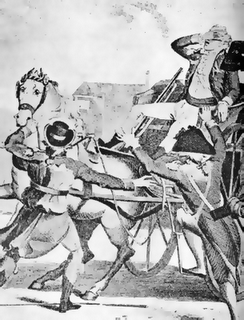 Richard Barry, 7th Earl Barrymore (1769-1794), was just 24 when he died. Known as 'Hellgate', he was a womaniser and a sportsman, and was said to have squandered 300,000 pounds in his short life. One of the founding members of the famous Four Horse Club, he had a lively wit and founded a number of other clubs with rules like 'if any member has more sense than another he be kicked out of the club'. Even though he had obtained her guardians' consent to the match, he eloped to Gretna Green with Charlotte Goulding, niece of the infamous Lady Lade and daughter of a sedan chairman. The lady shared his interest in bare-knuckled boxing and actually sparred herself, hardly the sort of pastime we expect from a countess!
Richard Barry, 7th Earl Barrymore (1769-1794), was just 24 when he died. Known as 'Hellgate', he was a womaniser and a sportsman, and was said to have squandered 300,000 pounds in his short life. One of the founding members of the famous Four Horse Club, he had a lively wit and founded a number of other clubs with rules like 'if any member has more sense than another he be kicked out of the club'. Even though he had obtained her guardians' consent to the match, he eloped to Gretna Green with Charlotte Goulding, niece of the infamous Lady Lade and daughter of a sedan chairman. The lady shared his interest in bare-knuckled boxing and actually sparred herself, hardly the sort of pastime we expect from a countess!Despite his reckless way of life, it was while doing his duty that the earl was killed. His regiment was stationed at Sussex during the French revolution with orders to strengthen border defence. In addition, he was responsible for some French prisoners, which obliged him to keep a loaded gun with him at all times. While driving a gig, the gun went off accidentally, shooting him through the eye. He died 40 minutes later.
A bare telling of the facts of Barrymore's life raise the most intriguing questions about this young man. No doubt he was selfish, profligate and insensitive, yet he had a keen wit, displayed qualities of leadership, generosity towards his dependants and considerable physical courage and sporting prowess. I wonder what he would have been like at 40? Raddled with gout and riddled with the pox? Or upon maturing, would he have put his intelligence and talents to good use? Can a rake be redeemed as so many Regency historicals tell us? Perhaps, when there is enough of the good mixed in with the bad, they can.




